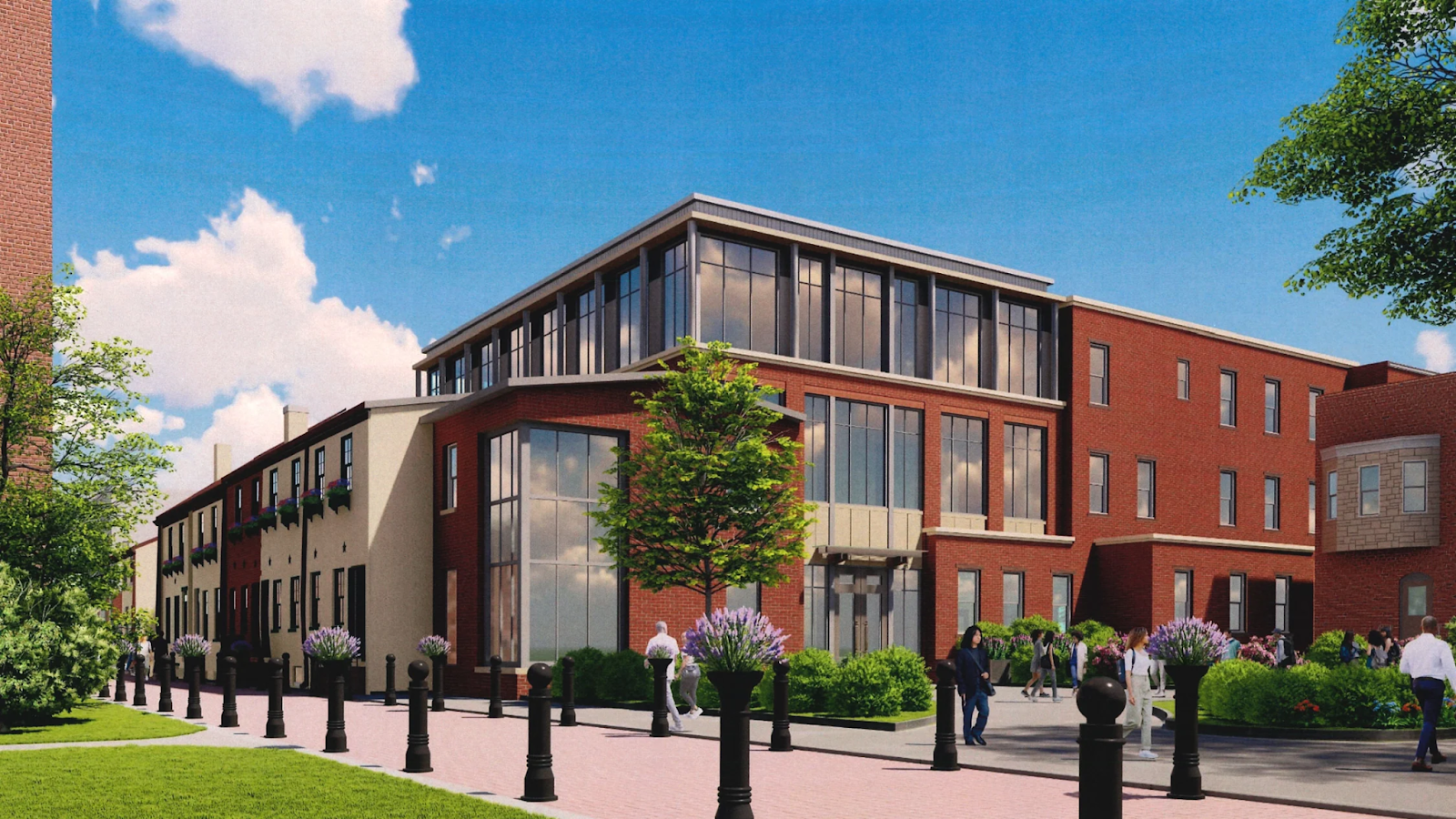
Cooper Street Gateway Project
Render Credit: Douglas Shelton
On May 9th 2024, the construction of the Cooper Street Gateway Project officially broke ground. At the ceremony, Chancellor Antonio D. Tillis and others took up shovels and made the ceremonial first moves towards the construction of the new facility on the 400 Block of Cooper Street and Lawrence Street. The 50 thousand-square-foot facility is aiming to open by Fall 2026 and cost approximately $60 million. The project will be comprised of an outdoor meeting space, a three-story building that will be the new home of the College of Arts and Science, and renovations for the Lawrence Street homes to provide accommodations for visiting faculty.
The new College of Arts and Science building will contain approximately “80 private offices, about 80 open “hoteling”-style work stations, conference rooms, a faculty lounge, and miscellaneous support spaces,” according to a Rutgers Inside IPO newsletter. In the newsletter, Tom Rosenkilde, Senior Facilities Project Manager for Project Services at Rutgers, who is managing the project, explains that “the jewel of this project will be a large event space with an outdoor courtyard. Designed to accommodate a variety of events, the space will feature a pre-function lobby, sophisticated audio-visual equipment, and even a commercial catering kitchen.”
Chancellor Antonio D. Tillis and others breaking ground. Credit: Ron Downes Jr.
The 13 lots and eleven structures comprising the site are currently vacant; despite this, the buildings are part of Camden’s Cooper Street Historic District. The rowhouses date back to the mid-19th century and were divided into higher-income housing along Cooper Street and lower-income housing along Lawrence Street. The buildings managed to survive mid-20th century urban renewal and saw the addition of several garages. They were then acquired by Rutgers in 2005 and 2007 with plans to be used for future expansion. By 2020, most of the houses stood vacant.
At the moment, the buildings and the clearing between them are the site of an archeological study. Rutgers is working with E2 Project Management to complete phase 3 of the archeological process. This includes the excavation and removal of artifacts by professional archeologists. Much of the clearing was used as outhouses, making them perfect for providing insight into the consumption habits of people at the time, according to Jamie Kouba, lab manager at E2 Project Management. What was once considered trash is now being used to understand the lives of people up to 200 years ago and how their lives may have differed due to socioeconomic status. The artifacts will be handed over to the Department of Art History and Museum Studies here at Rutgers Camden once the excavation has concluded. To learn more about the history of the 400 Cooper Street block, visit MARCH’s page about the 400 block.
Brick outhouse uncovered by the archeological team used by both Cooper Street and Lawrence Street tenants.
Broken bottles and glassware found on site. They are yet to be dated.
To preserve the history of these buildings and the city, the facades will be renovated and kept. Despite this effort, some dilapidated structures must be demolished. To ensure the preservation of the site’s history, the university has retained Clark Caton Hintz, a NJ-based firm that is “known for its expertise in historic preservation,” according to Chancellor Tillis. The firm has worked on projects such as The Hun School of Princeton’s New Dormitory, the Ocean County Justice Complex, and historic preservation projects such as the Hinchliffe Stadium. Currently, the process of choosing a developer is underway.
Current Cooper street view and site entrance
Current Lawrence Street view
The $60 million dollar project is funded through a variety of means: $25 million is being provided by the state through funds that were given by the federal government through the American Rescue Plan; the rest will be made up of “Rutgers tax-exempt and taxable commercial paper, Rutgers tax-exempt and taxable bonds, and funds on hand.” This means that Rutgers will be using funds it currently has or will have as well as incurring debt in order to pay for the building. Currently, no precise breakdown is available of the methods the university will use to fund the construction of the building.
The Gleaner was additionally unable to find documentation on how, given the recent decrease in state funding to the university, Rutgers will pay off this debt. According to a 2024 document, Rutgers is currently able to cope with these decreases in funding by cutting costs to programs such as a reduction of $333,000 for Rutgers Camden Law School’s Legal Assistance for Tenants, a reduction of $210,000 for Student Mental Health and Wellbeing, and a reduction of $75,000 for Rutgers Camden Business School’s Center for Real Estate. On the question of how the university will cope with the decreased funding, Rutgers responded that, “Without additional operating support, there will be significant upward pressure on tuition and fees, Rutgers’ largest source of recurring revenue.”
According to the same 2024 document, the project has not encountered any cost overruns at the time of writing. However, according to a paper on the Causes and Effects of Cost Overruns in Construction Projects, “construction projects face a mean cost overrun of 28% inevitably.” This raises the possibility of cost overruns in the future.
Credit terrain image from Google Maps. The red circle contains the house on Lawrence Street to be renovated. The purple circle contains the derelict and vacant buildings to be demolished.
The Cooper Street Gateway Project is part of a larger program to upgrade and improve Rutgers Camden, according to Chancellor Tillis during March 27, 2024’s SGA meeting. The chancellor mentioned some of the improvements, such as the Walter K. Gordon Theater having been recarpeted during spring break of 2024 and Starbucks having closed in March of 2024 for renovations. He also announced that the Stedman Theater and the Digital Studies buildings are renovation targets. After the construction of the new College of Arts and Sciences building, classroom space will open up in Armitage, allowing for new potential uses. Plans have not yet been confirmed for the opened-up space. Students will be waiting eagerly for more updates on the project.
Sources:
https://camden.rutgers.edu/chancellor-messages/cooper-street-gateway-project
https://ipo.rutgers.edu/cooper-st-gateway
https://indd.adobe.com/view/75bc9e48-d01c-48bb-8481-652d02508a7f?startpage=4
https://pub.njleg.state.nj.us/publications/budget/governors-budget/2025/Rutgers_response_2025.pdf

